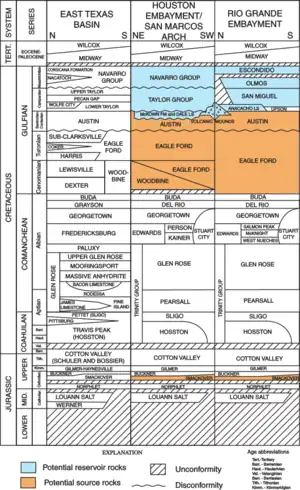| Paluxy Formation | |
|---|---|
| Stratigraphic range: Early Cretaceous | |
| Type | Geological formation |
| Unit of | Trinity Group |
| Sub-units | Baum Limestone Member, Georges Creek Member, Lake Merritt Member[1] |
| Underlies | Walnut Formation (Fredericksburg Group) |
| Overlies | Glen Rose Formation |
| Thickness | up to 1,450 ft (440 m)[2] |
| Lithology | |
| Primary | Sandstone, mudstone, limestone |
| Location | |
| Region | North America |
| Type section | |
| Named for | Paluxy, Texas |
| Named by | Robert Thomas Hill[3] |

Paluxy Formation stratigraphic column in Texas
The Paluxy Formation is a geological formation found in Texas, Louisiana, Arkansas, Mississippi and Oklahoma, whose strata date back to the Early Cretaceous. Dinosaur remains are among the fossils that have been recovered from the formation.[4]
Vertebrate paleofauna
- Coelurosauria indet.[5]
- Cedarosaurus weiskopfae[6]
- Astrophocaudia slaughteri[6]
- Nodosauridae indet.
- Tenontosaurus cf. tilletti
See also
References
- ↑ "Geologic Unit: Paluxy". National Geologic Map Database. USGS. Retrieved 31 May 2014.
- ↑ "Summary of Citation: Paluxy". National Geologic Map Database. USGS. Retrieved 31 May 2014.
- ↑ Hill, R.T. (1891). "The Comanche series of the Texas-Arkansas region". Bulletin of the Geological Society of America. 2 (1): 504, 509, 510–511.
- ↑ Weishampel, David B; et al. (2004). "Dinosaur distribution (Early Cretaceous, North America)." In: Weishampel, David B.; Dodson, Peter; and Osmólska, Halszka (eds.): The Dinosauria, 2nd, Berkeley: University of California Press. Pp. 553-556. ISBN 0-520-24209-2.
- ↑ Langston, W. 1974. Nonmammalian Comanchean tetrapods. Geoscience and Man 8: 77-102.
- 1 2 D’Emic, Michael D. (2012). "Revision of the sauropod dinosaurs of the Lower Cretaceous Trinity Group, southern USA, with the description of a new genus". Journal of Systematic Palaeontology. 11 (6): 707–726. doi:10.1080/14772019.2012.667446.
This article is issued from Wikipedia. The text is licensed under Creative Commons - Attribution - Sharealike. Additional terms may apply for the media files.